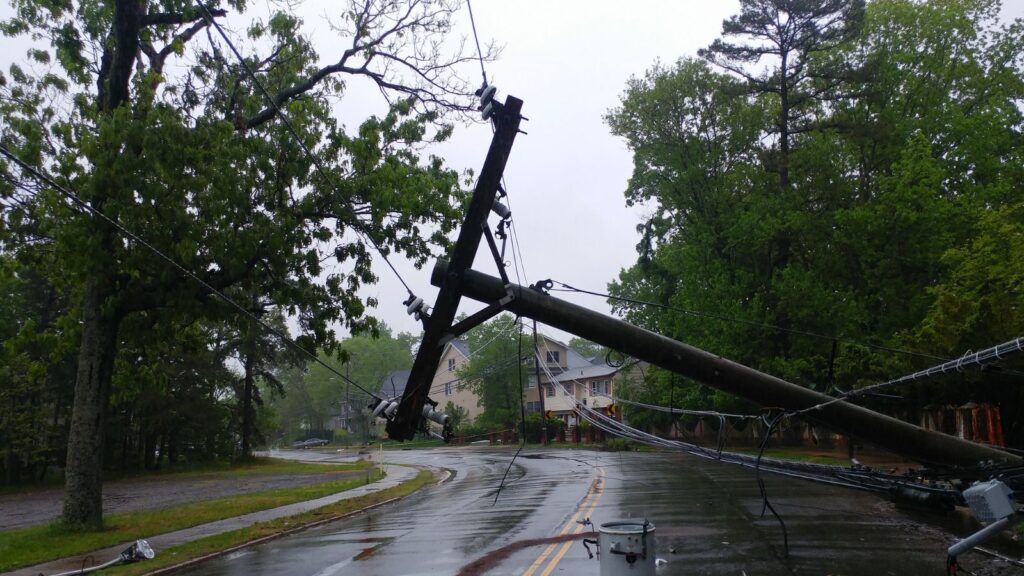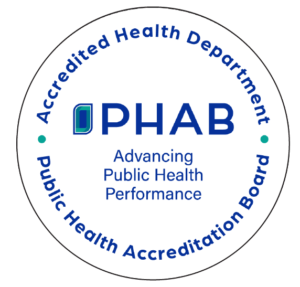According to the National Weather Service (NWS), four confirmed EF-1 tornadoes touched down across Northeast Ohio on Tuesday, August 6th. Lake County, Ohio was in the path and suffered fallen trees, downed power lines, and power outages that have impacted many residents for multiple days. Debris is being cleared from roads and electric companies are working to restore power to Lake County residents. In the meantime, if you are one of the many residents facing an ongoing power outage, the Lake County General Health District (LCGHD) wants you to put safety first as you wait for your power to be restored.
Food Safety when there’s no power
DURING
- Keep refrigerator and freezer doors closed.
- If the doors stay closed, food will stay safe up to: 4 hours in a refrigerator, 48 hours in a full freezer, 24 hours in a half-full freezer.
- If the power has been out for 4 hours, and a cooler and ice are available, put refrigerated perishable foods in the cooler. To keep them at 40°F or below, add ice or a cold source like frozen gel packs.
AFTER
Never taste food to know if it is safe to eat. When in doubt, throw it out.
- Throw out perishable food in your refrigerator (meat, fish, cut fruits and vegetables, eggs, milk, and leftovers) after 4 hours without power or without a cold source like ice. Throw out any food with an unusual smell, color, or texture.
- If you have an appliance thermometer in your refrigerator, check to see if it is still at 40 °F or below.
Prevent carbon monoxide poisoning when using portable generators
- Never use a generator inside your home or garage, even if doors and windows are open.
- Only use generators outside, more than 20 feet away from your home, doors, and windows.
- When using a generator, use a battery-powered or battery backup CO detector in your home.
When your Sewage Treatment System experiences a power outage
Electrical power outages may affect the operation of your home sewage treatment system. Sewage treatment systems operate either by gravity, or involve the use of pumps and valves that require electricity. You will need to determine which type of system serves your home. If your system is electric:
- Limit water usage to essentials such as toilet flushing and hand washing. Laundry, bathing, showers, and dishwashing should be minimized or eliminated during the power outage. Don’t let the water run while brushing teeth, shaving or rinsing dishes. Don’t flush the toilet each time it’s used for liquid waste.
- The septic tank can hold about one-day’s supply of waste. Once the tank is filled, additional waste can back up into your home.
- Stop all water use if electrical outage is extended or the plumbing begins to drain slowly. Slow-draining plumbing may indicate that the reserve capacity in the tank is exceeded and the system is full. If the system has a pump, turn off the pump at the control panel. Effluent (liquid sewage from the septic tank) will continue to build up in the pump chamber until it resumes operation.
Drive Safely When There’s No Electricity
Come to a Full Stop at Traffic Signals without Power: Treat the intersection as a four-way stop. Come to a full stop before entering the intersection, look before you proceed, and take turns, one-by-one, when entering the intersection.
Be Informed
Before the next emergency, identify how authorities will notify you and keep you informed. This may include outdoor sirens that alert you to turn on your local television and radio stations, a National Oceanic and Atmospheric Administration (NOAA) weather radio, or the Internet/social media. In addition, Lake County has a Wireless Emergency Notification Service (WENS), which is a reverse 9-1-1 system that can alert you about emergencies in your area. You can sign up to receive call or text alerts by visiting: https://www.lakecountyohio.gov/emergency-management-agency/preparedness/notification/ .
Did you know?
If you live in Perry, Madison, Painesville, Concord, Leroy, Fairport, Grand River, and Mentor, which are communities within 10 miles of the Perry Nuclear Power Plant, LCGHD has a program in partnership with the Ohio Department of Health and the Nuclear Regulatory Commission to provide free potassium iodide (KI). KI is a salt tablet that can be taken to protect the thyroid from absorbing dangerous radioactive iodine by filling the thyroid with a stable iodine. This helps protect the thyroid gland and can help prevent thyroid cancer if radioactive iodine is released in an emergency. Individuals may pick up KI for their household by visiting the Health District at 5966 Heisley Road, Mentor, Ohio, or one of our partner pharmacies or town halls listed on our website at https://www.lcghd.org/potassium-iodide-ki/
For more information on how you can prepare for emergencies, please visit: redcross.org (American Red Cross), cdc.gov (the Centers for Disease Control and Prevention), and ready.gov (United States Department of Homeland Security).


